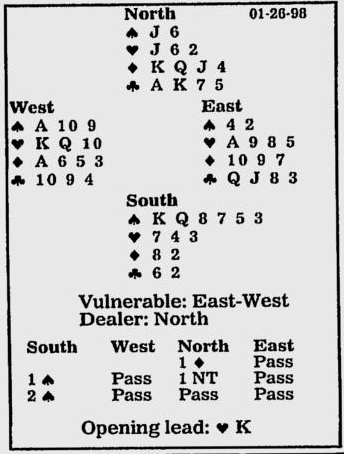Ocala Star-Banner – Jan 27, 1998
John Lowenthal is one of the world’s most imaginative bridge players. In particular, he is an excellent defender, and he is renowned for his opening leads, which are often so unusual that Henry Bethe devised Lowenthal’s Laws of Opening Leads: If Lowenthal leads a low card, he has an honor combination. If he leads an honor, it is unsupported. And if he wants a ruff he leads a trump.
Given that preamble, you have a shot at solving today’s deal, which occurred in St. Moritz a few years ago.
Vulnerable E-W, Dealer North
You, West receive: ![]() A 10 9
A 10 9 ![]() K Q 10
K Q 10 ![]() A 6 5 3
A 6 5 3 ![]() 10 9 4
10 9 4
The bidding:
| West | North | East | South |
| 1 |
Pass | 1 |
|
| Pass | 1NT | Pass | 2 |
| All Pass | |||
| |
|
| |
|
Against 2![]() , you lead the
, you lead the ![]() K:
K: ![]() 2,
2, ![]() 9,
9, ![]() 3. How do you continue?
3. How do you continue?
If playing the modern 15-17 range, North might have opened one no-trump. But those major-suit jacks are probably not pulling their full weight.
There is only one way to defeat the contract. The defenders must score three hearts, one diamond and two spades. The 13th heart from East must bring about a trump promotion for West. However, while dummy’s spade jack remains, ready to overruff West, no promotion is possible. That jack must be removed.

West switched correctly to the ![]() 10, leading a trump when he wanted a ruff. Declarer won in hand with the king (winning in the dummy is no better), then he played a diamond. West went in with his ace, cashed the spade ace, and continued with the
10, leading a trump when he wanted a ruff. Declarer won in hand with the king (winning in the dummy is no better), then he played a diamond. West went in with his ace, cashed the spade ace, and continued with the ![]() Q and
Q and ![]() 10.
10.
East did his part, overtaking with the ace and returning his last heart, which effected the trump promotion.
There’s something very satisfying about pulling off a defense like that.
Esta entrada también está disponible en: Spanish

